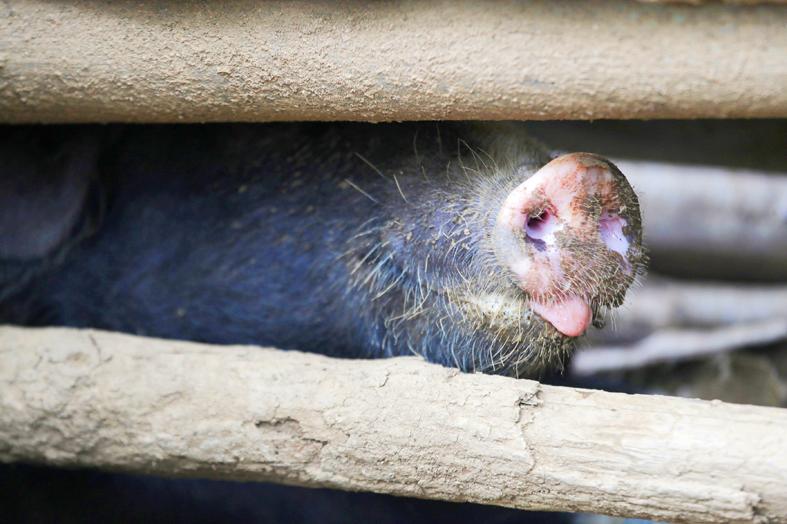Scientists revived vital organs from deceased pigs with a technology that shows promise for organ transplantation and further blurs the line between life and death.
The research, published on Wednesday in the journal Nature, challenges the assumption that tissue death is swift and irreversible, as the scientists were able to restore the function of several organs an hour after the pigs’ hearts had stopped.
“The latest findings raise a slew of questions — not least, whether medical and biological determinations of death will need revising,” Brendan Parent, director of transplant ethics and policy research at New York University’s Grossman School of Medicine, said in a commentary accompanying the article.

Photo: Reuters
The findings might also force a rethink of critical care processes, he said.
Shortly after cardiac arrest, blood stops coursing through the body, resulting in a lack of oxygen and nutrient circulation that sets off a cascade of events leading to cellular death and organ injury. Scientists have been looking for ways to protect cells and organs from this process for years.
Researchers led by David Andrijevic, a professor at Yale University’s School of Medicine, adapted a technology called BrainEx for whole-body use and found it performed better than a standard technique for artificially adding oxygen to blood — called extracorporeal membrane oxygenation — which is used in hospitals to support patients whose organs have failed.
The system called OrganEx, designed by Andrijevic and two colleagues, allowed oxygen to be recirculated through the pigs’ bodies, preserving cells and organs an hour after a cardiac arrest.
The group earlier showed that BrainEx could restore some activity in the cells of pig brains after hours of oxygen deprivation.
The findings hold promise for preserving and transporting organs for transplant, researchers said, although they were reluctant to speculate about other uses.
“This is very far from use in humans,” Yale University Interdisciplinary Center for Bioethics director Stephen Latham said, adding that the process would require far more study before scientists could consider it for people.
Others who were not involved in the research said the findings have further ramifications.
“Biological death is more like a cascade of dominoes, with one event triggering the next, than an instantaneous transition,” said Martin Monti, a professor of cognitive psychology at the University of California, Los Angeles.
“What is groundbreaking about this technology is that this cascade can be halted in some organs if only the right cellular environment and metabolic parameters can be restored,” Monti said. “The potential implications, if this will ever be successfully translated to humans, are huge.”
The researchers said that the pigs did not suffer pain because they were anesthetized and that no electrical activity could be detected in their brains.

CHIPMAKING INVESTMENT: J.W. Kuo told legislators that Department of Investment Review approval would be needed were Washington to seek a TSMC board seat Minister of Economic Affairs J.W. Kuo (郭智輝) yesterday said he received information about a possible US government investment in Taiwan Semiconductor Manufacturing Co (TSMC, 台積電) and an assessment of the possible effect on the firm requires further discussion. If the US were to invest in TSMC, the plan would need to be reviewed by the Department of Investment Review, Kuo told reporters ahead of a hearing of the legislature’s Economics Committee. Kuo’s remarks came after US Secretary of Commerce Howard Lutnick on Tuesday said that the US government is looking into the federal government taking equity stakes in computer chip manufacturers that

NORTHERN STRIKE: Taiwanese military personnel have been training ‘in strategic and tactical battle operations’ in Michigan, a former US diplomat said More than 500 Taiwanese troops participated in this year’s Northern Strike military exercise held at Lake Michigan by the US, a Pentagon-run news outlet reported yesterday. The Michigan National Guard-sponsored drill involved 7,500 military personnel from 36 nations and territories around the world, the Stars and Stripes said. This year’s edition of Northern Strike, which concluded on Sunday, simulated a war in the Indo-Pacific region in a departure from its traditional European focus, it said. The change indicated a greater shift in the US armed forces’ attention to a potential conflict in Asia, it added. Citing a briefing by a Michigan National Guard senior

POWER PLANT POLL: The TPP said the number of ‘yes’ votes showed that the energy policy should be corrected, and the KMT said the result was a win for the people’s voice The government does not rule out advanced nuclear energy generation if it meets the government’s three prerequisites, President William Lai (賴清德) said last night after the number of votes in favor of restarting a nuclear power plant outnumbered the “no” votes in a referendum yesterday. The referendum failed to pass, despite getting more “yes” votes, as the Referendum Act (公民投票法) states that the vote would only pass if the votes in favor account for more than one-fourth of the total number of eligible voters and outnumber the opposing votes. Yesterday’s referendum question was: “Do you agree that the Ma-anshan Nuclear Power Plant

ENHANCED SECURITY: A Japanese report said that the MOU is about the sharing of information on foreign nationals entering Japan from Taiwan in the event of an emergency The Ministry of Foreign Affairs yesterday confirmed that Taiwan and Japan had signed an agreement to promote information exchanges and cooperation on border management, although it did not disclose more details on the pact. Ministry spokesman Hsiao Kuang-wei (蕭光偉) said the ministry is happy to see that the two nations continue to enhance cooperation on immigration control, in particular because Taiwan and Japan “share a deep friendship and frequent people-to-people exchanges.” “Last year, more than 7.32 million visits were made between the two countries, making it even more crucial for both sides to work closer on immigration and border control,” he said. Hsiao